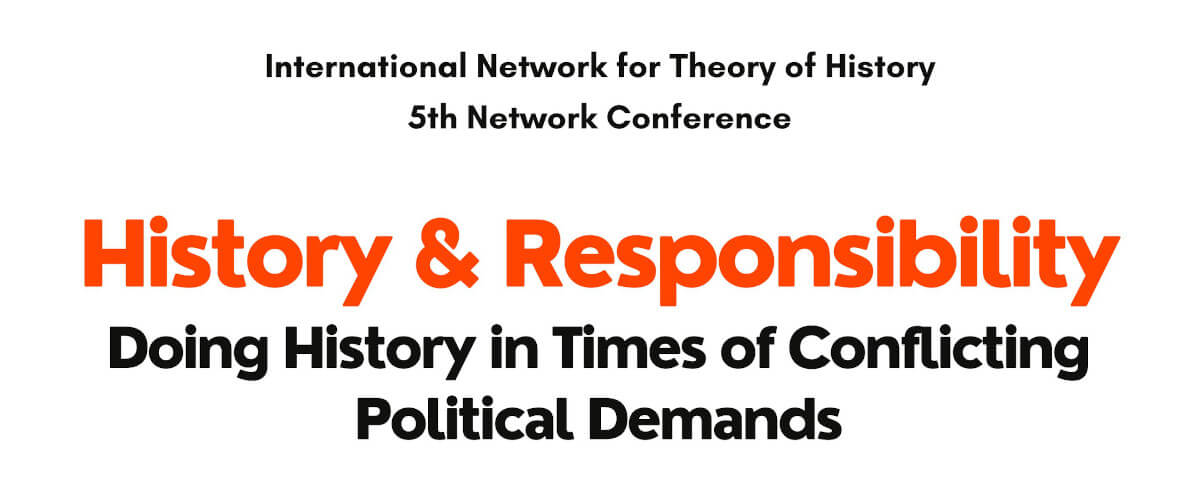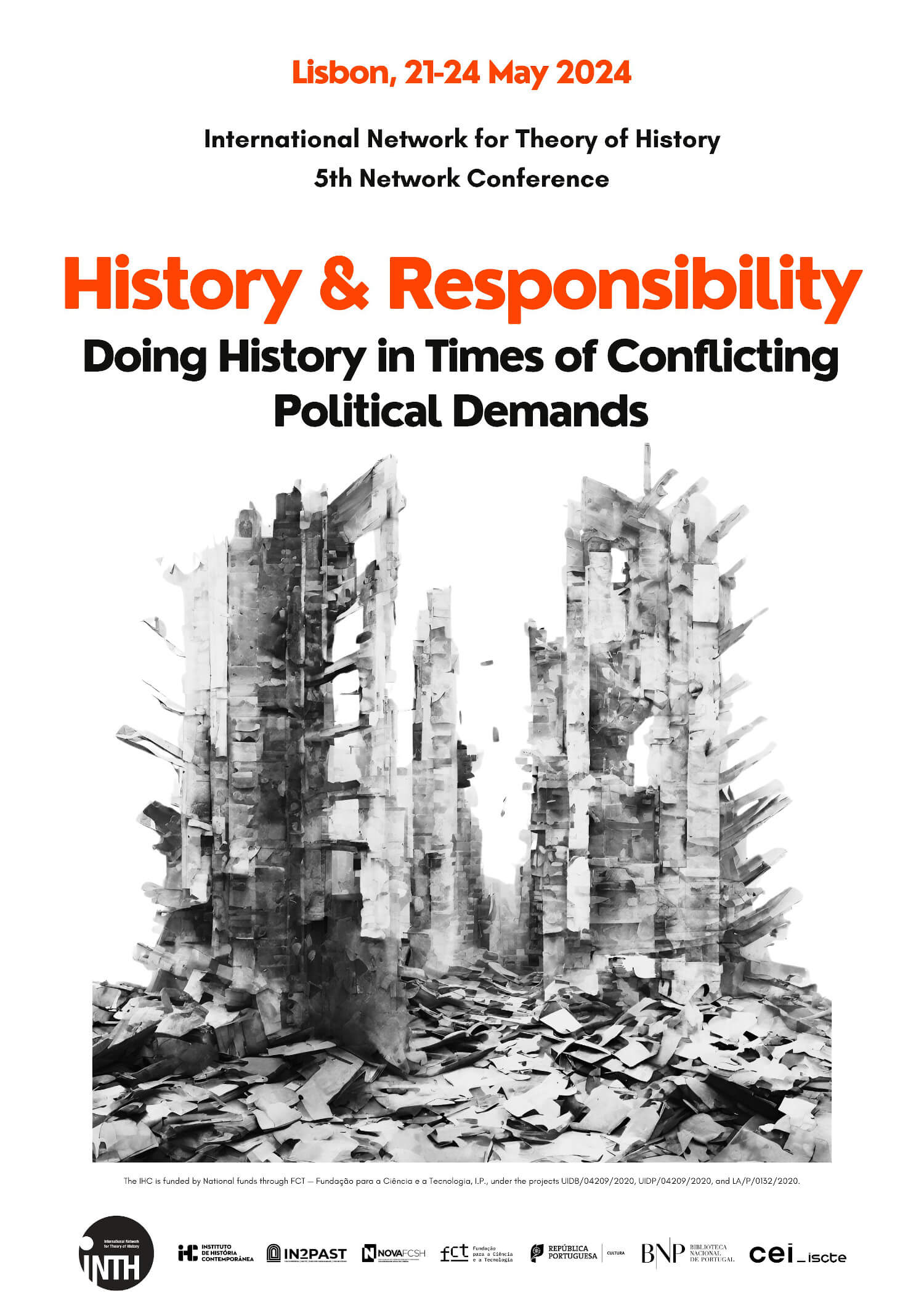maio, 2024

Detalhes do Evento
Fifth network conference of the International Network for Theory of History, gathering theorists of history and historians of historiography from around the world. History & Responsibility: Doing History
Ver mais
Detalhes do Evento
Fifth network conference of the International Network for Theory of History, gathering theorists of history and historians of historiography from around the world.
History & Responsibility:
Doing History in Times of Conflicting Political Demands
5th network conference of the International Network for Theory of History
The International Network for Theory of History (INTH) is pleased to announce that its fifth network conference will take place on 22, 23 and 24 May 2024 and will be hosted by the Institute of Contemporary History at NOVA University Lisbon. The goal of the conference is to gather theorists of history and historians of historiography from around the world, and foster the exchange of ideas, questions, and resources. This year’s overarching theme is historical responsibility.
The writing of history has always involved ethical concerns. But the past few decades have witnessed increasing and widespread public discussions about the responsibility of history and historians in society. Perhaps the most famous examples of this are the debates surrounding historical wrongs and their relation to contemporary injustices and inequalities. Think, for instance, of the initiatives that seek to address the role of historical slavery in contemporary racism or the continuing influence of colonial legacies on (global) power relations. The idea of historical wrongs has also been raised in relation to the impact of past pollution on climate change, or the influence of institutional child abuse on contemporary socio-economic problems faced by indigenous communities.
Historians and their work have often been under the spotlight in such discussions: while some wish to see (academic) historiography as an important resource to back-up and legitimate claims for historical redress, others see it as having been neglectful of, or even (in)directly involved in, historical wrongs. Historians themselves have expressed conflicting views about what the ethical commitments of the profession should be.
The current proliferation of debates about the link between history and contemporary injustices provide an opportune moment to reflect on the relationship between history and responsibility more generally. This relationship is undoubtedly complex, ambiguous, and contested. Many historians have warned that engagements with the past do not inherently serve justice or lead to morally responsible behavior (Minow 1999; Torpey 2001). Old critiques of the blind belief in historical progress or teleological conceptions of historical time have also unsettled the idea that historians and/or history itself can be the agents of “history’s judgment” (Scott 2020). In the field of memory studies as well, scholars have pointed out how the “moral remembrance” of dark pasts does not automatically lead to an enlightened “good citizenship” or increased respect for other cultures and noted that it sometimes even produces an entirely opposite attitude (David 2020; Gensburger and Lefranc 2020).
Despite these criticisms, many have refused to entirely give up on the idea that history connects to (moral) responsibility (Cotkin, 2008). If there is not even a weak moral motive involved in our engagements with the past, why bother studying history at all? In any case, many policymakers and professional historians appear to believe that engaging with history can lead people to become more ethically responsible.
Of course, many of the issues raised in these recent debates are not new. Historians have always reflected on what can be considered (ir)responsible ways of doing historical research or writing history. Recently, however, a genuine ‘ethical turn’ in our field appears to have gained a new momentum. We now hear calls for the rehabilitation of value judgment about the past (Bloxham 2020), explicit pleas for the creation of an ethical code for a ‘Responsible History’ (De Baets 2009), and an increasing focus on epistemic virtues (Paul 2022), epistemic justice (Domanska 2021), or the figure of the moral witness (Tozzi 2012).
Keynote speakers:
Joan W. Scott (Institute for Advanced Study, USA)
Pedro Cardim (NOVA University Lisbon, Portugal)
Herman Paul (University of Leiden, The Netherlands)
>> Final Programme (PDF) <<
(updated on 20 May 2024)
Call for papers
For the 2024 edition of the INTH Network conference we invite contributors to reflect on the entangled issues of historical responsibility and responsible history. We propose the following guiding questions:
1. (How) are we responsible to history?
• How can we conceptualize ‘historical responsibility’ and how does it relate to historical ‘guilt’ or ‘debt’?
• (How) can responsibility be transmitted over generations? Is it typically a collective affair or does it primarily stick to particular individuals?
• Can we ‘owe’ something to the past or the dead?
• Are there temporal (or other) limits as to how far back one can go in history for the purpose of redeeming it or holding people responsible?
• Can grave historical injustices be ‘superseded’ by changed circumstances in the present (e.g. composition of populations, changed socio-economic relations or political systems)?
• Should priority be given to so-called ‘enduring injustices,’ (Spinner-Halev, 2012) whereby historical grievances have clear ties to contemporary injustices, or should historical wrongs be addressed independently of their legacy in the present?
2. (How) can we write responsible/responsibilizing histories?
• What kind of engagement with the past can help to foster a democratic political culture, address enduring injustices, or counter ultra nationalist, neo-fascist and other extremist political tendencies?
• What kind of historical narrations or other types of historical representation can be considered (ir)responsible in relation to particular contexts?
• Is the prime responsibility of professional historians a deontological one relating to academic procedures and source criticism, or can particular situations trump these and create other priorities and types of responsibility?
• Does a focus on historical responsibility always lead to forms of ‘presentism’ and is this a problem?
• Which political or socio-cultural circumstances are detrimental to the production of a responsible/responsibilizing history?
• How do the issues of historical responsibility and responsible history figure in post- and de-colonial approaches to history?
Other Topics
The main focus of this conference is on history and responsibility. Yet, as was the case for the previous meetings of the INTH, we also welcome papers on other relevant topics in the fields of Theory of History and History of Historiography, including (but not limited to):
• Conceptual history
• Epistemics of history
• Experience/presence
• Hermeneutics
• Historical time
• History and mourning/trauma
• History as science (causation, explanation, lawfulness…)
• Narrativism
• Politics of history and memory
• Public/popular history
• Substantive/speculative philosophy of history
• The history of historiography
• Theory of history didactics
• The relations between history and other academic fields
• History outside academia
Practical information
Those interested in taking part in the conference are invited to send in an abstract of 300-500 words either in docx or pdf format to inthlisbon@gmail.com by 18 September 2023. Please name your file following this structure: Surname_Title of the abstract.
We will consider both proposals for panel sessions and individual papers. Panel proposals should include a panel abstract, a commentator and a chair, and abstracts for the contributing papers (all following the 300-500 words limit per abstract).
Please visit the conference website for further information.
The organizing committee is led by Berber Bevernage (Ghent University), Felipe Brandi (NOVA University Lisbon), José Neves (NOVA University Lisbon), Luis Trindade (NOVA University Lisbon), Kenan Van De Mieroop-Al Bahrani (Leiden University) and Eva Willems (Ghent University). Please use the conference email address for all correspondence.
>> 📎 Download the call for papers (PDF) <<
References
Bloxham, Donald (2020). History and Morality (Oxford University Press).
Booth, W. James (2019). Memory, Historic Injustice, and Responsibility (Routledge).
Cotkin, George (2008). “History’s Moral Turn.” Journal of the History of Ideas 69, no. 2 (April 4, 2008): 293–315
David, Lea (2020). The Past Can’t Heal Us. (Cambridge University Press).
De Baets, Antoon. (2009) Responsible History (Berghahn Books).
Domańska, Ewa. “Prefigurative Humanities.” History and Theory 60, no. 4 (2021): 141–58.
Gensburger, Sarah, and Sandrine Lefranc (2020). Beyond Memory: Can We Really Learn From the Past? (Palgrave Macmillan).
Minow, Martha (1999). Between Vengeance and Forgiveness: Facing History after Genocide and Mass Violence. (Beacon Press).
Paul, Herman. Historians’ Virtues: From Antiquity to the Twenty-First Century. Cambridge: Cambridge University Press, 2022.
Scott, Joan Wallach (2020). On the Judgment of History. (Columbia University Press).
Spinner-Halev, Jeff (2012). Enduring Injustice (Cambridge University Press).
Waldron, Jeremy. (1992) ‘Superseding Historic Injustice,’ Ethics 103, no. 1: 4–28.
Torpey, John. (2001) ‘“Making Whole What Has Been Smashed”: Reflections on Reparations,’ Journal of Modern History 73, no. 2: 333–58.
Tozzi, Verónica. (2012), ‘The Epistemic and Moral Role of Testimony,’ History and Theory 51, no. 1: 1–17.
Tempo
21 (Terça-feira) 8:30 am - 24 (Sexta-feira) 7:00 pm
Localização
National Library of Portugal and Iscte — University Institute of Lisbon
Lisbon
Organizador
Institute of Contemporary History — NOVA School of Social Sciences and Humanities and International Network for Theory of History

